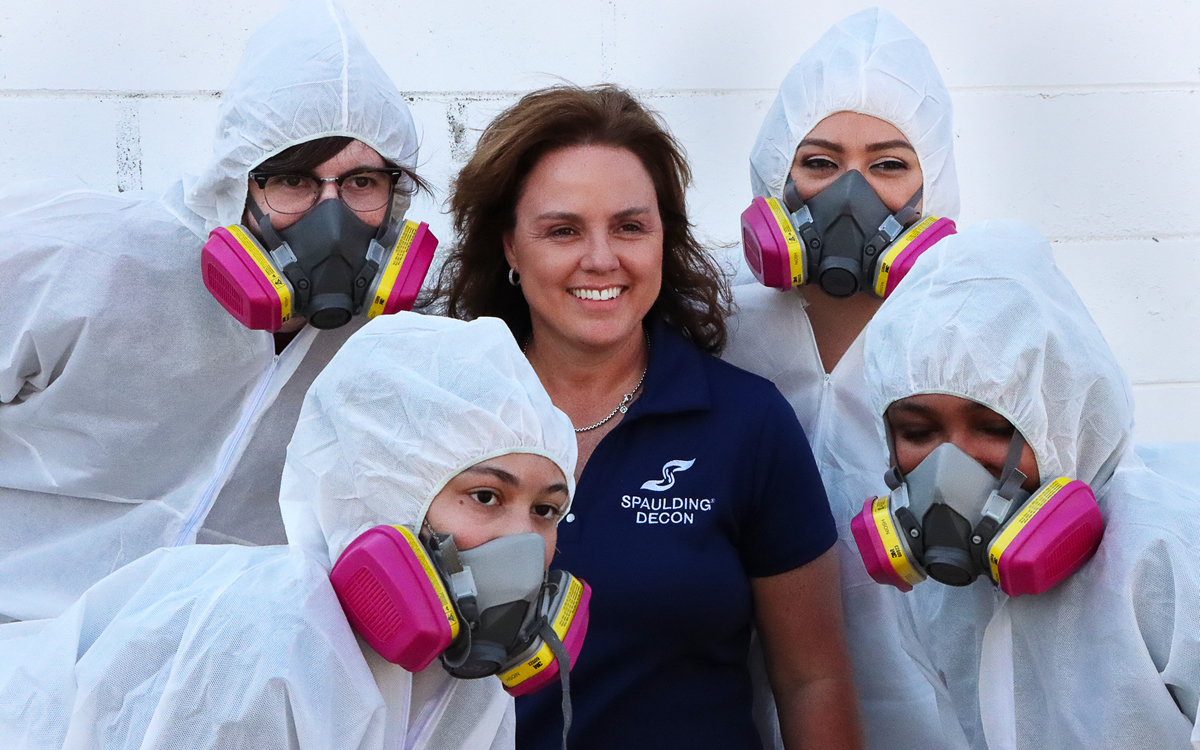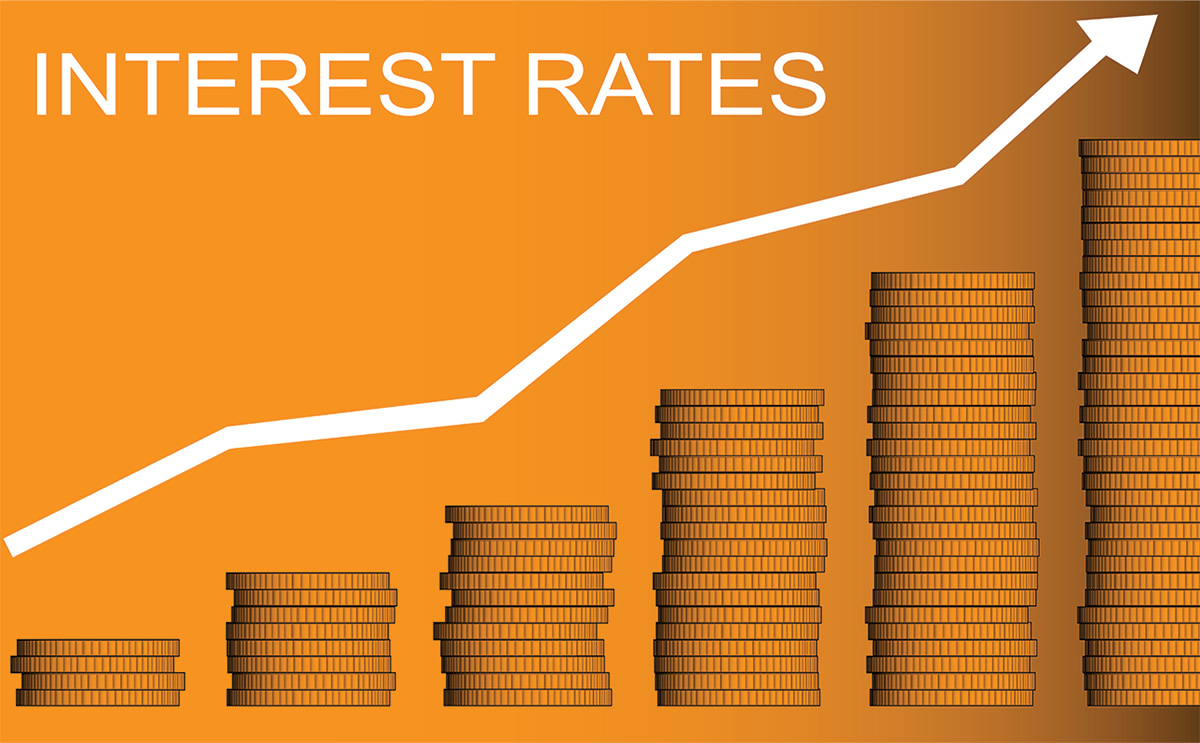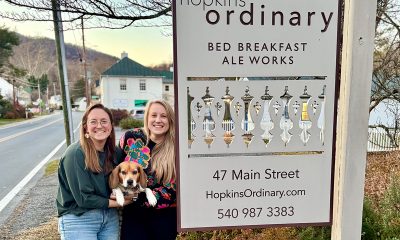Financial
Lesbian entrepreneur uses crime scene TikTok to educate
‘You can change people’s lives by returning things to pre-incident condition’

(Editor’s note: This is the second in a multi-part summer series of stories taking a closer look at how a group of diverse LGBTQ entrepreneurs survived and thrived during the pandemic. The series is sponsored by the National LGBT Chamber of Commerce.)
Spaulding Decon’s 4.2 million followers probably tune into the company’s popular crime scene cleaning TikTok to watch technicians scrub away blood or dismantle drug labs, but sometimes Founder and CEO Laura Spaulding slips in a little more.
“Today we’re going to be talking about the affordable housing crisis,” Spaulding, a former Kansas City police officer, tells viewers in an April teaser; later a young woman shares how difficult it has been surviving outside the benefits threshold.
Spaulding founded her multimillion-dollar business specializing in biohazard clean up in 2005, and in 2016 it became the first nationally franchised decontamination service.
However, the onset of the global pandemic threatened to derail the success of this lesbian entrepreneur.
When states were going into lockdowns in 2020, in a desperate effort to slow the pandemic’s death toll and contain the spread of the disease, many businesses struggled. According to Commerce Department data, real GDP across industry sectors fell sharply in the second quarter of 2020 as the world plunged into an economic recession.
Spaulding said surviving the crisis meant being able to navigate quickly in a new environment. Her business survived, in part, by reaching out via social media to the millions who unexpectedly found themselves locked down.
“We actually grew our business during the pandemic,” Spaulding told the Blade. “Other brands possibly didn’t do that because they were in crisis mode. But we showed viewers an insight into what disinfecting for COVID looks like. We gained a ton of followers because of that.”
In 2021, Spaulding Decon made the Inc. Magazine list of the 5,000 fastest growing private companies, an honor that gave Under Armor, Patagonia and Microsoft their first national recognition.
Inc. noted the “unprecedented challenges” this group of honorees faced in 2020, to not only survive but thrive with an average median three-year growth rate of 543 percent and combined median revenue nearing $11 million.
This was an achievement Spaulding said she never dreamed was possible. When she started her company, she did so with little outside investment and sheer determination.
“I’m just a regular person trying to build a business,” Spaulding said about her challenges. “[Being a lesbian business owner] hasn’t hindered me or benefitted me either. I’ve never gotten a contract because of it. But it will only hinder you if you let it.”
And she said the struggle for labor is real. Turnover among technicians is high.
Working long hours in protective equipment can be physically demanding, and cleaning up after violent deaths can take an emotional toll, but Spaulding enjoys working alongside those who tough it out with her.
“The people that I work with are amazing,” she said. “Since COVID, we’re operating with fewer staff members than we’ve ever had, but I enjoy being with them, side-by-side. We’re mission based.”
‘You can change people’s lives’
Today, Spaulding lives with her partner of four years and co-parents a 4-year-old, a 3-year-old, and a rescue dog named Sammy, a retriever mix. But back in 2005, she was a police officer facing a distraught homicide victim’s mom who wanted to know when they were returning to clean up the crime scene.
Spaulding told the Story Exchange in February she felt bad for the mother who had just been through so much, but the only answer she had for her was “We don’t do that.”
So, Spaulding left police work and went into the crime scene cleaning business. The work has been challenging, but years later she has no regrets.
“You can change people’s lives by returning things to pre-incident condition,” she told the Blade. “Especially the suicide clean ups because they don’t have to see it. You can’t get rid of the memory of [seeing the person like that], but we can put that room back together.”
Even before the pandemic created a captive audience, there was interest from the media in Spaulding Decon’s work due to the inherent drama involved.
“We were getting approached with reality show producers. But they could never get it sold because they thought it would be too graphic,” Spaulding explained.
“So, I was like let’s do it ourselves and post it to YouTube, and that’s how the social media series was born.”
Currently, Spaulding Decon’s Crime Scene Cleaning YouTube channel has more than 800,000 subscribers, and while much of the content can be graphic, some can be off-beat and unexpected, such as the 1980s E.T. Atari game unearthed during a hoarding clean up.
As the pandemic moves into its long-term and less acute stage, Spaulding Decon’s social media presence and popularity continue to hold strong. Its Crime Scene Cleaning series now has a spin-off focusing on in-depth interviews with people dealing with a variety of subjects.
“We get DMs [direct messages] on our social channels about how do I clean this particular thing?” Spaulding explained. “And we’ll do videos on that to make sure people are educated.”
This desire to educate pushed Spaulding to grow her franchise in a new direction.
“We have a spin off called ‘Talking Decon,’” she said. “Where we do more investigative-type interviews. The last one was with a victim of human trafficking.”
This new series provides a chance for the former cop to engage the community in a meaningful way.
“We take an educational approach to social media. So we have a cult-like following,” Spaulding said. “And we stay in communication with followers and fans.”
NGLCC: It’s a ‘community thing’
Spaulding has worked hard to make her business a success and she credits her staff and technicians for working just as hard in their “labor of love.”
However, her biggest tip for new entrepreneurs and LGBTQ business owners is to find a mentor to learn from early on.
“You will get to where you need to be faster than by learning from your mistakes,” she added.
Spaulding also pointed out the support she found as a member of the National LGBT Chamber of Commerce (NGLCC). She found it nice to be able to bounce ideas off “our own people” in a safe and comfortable environment.
“It was more of a community thing,” she said. “And it’s important for all minorities to stay at the top of your game – it’s not an even playing field. It’s constant education. It’s constantly finding things that you can do better to overcome the competition.”
Economics professor M.V. Lee Badgett, a distinguished scholar at UCLA’s Williams Institute, has researched the benefits of LGBTQ equality on the economy. Her books have debunked the myth of gay affluence and instead highlight the economic challenges LGBTQ people face due to discrimination.
“The bottom line,” Badgett told the Blade. “Is that for an economy to perform as well as it could, it needs everyone to contribute as much as they have to offer.”
Justin Nelson, the NGLCC co-founder and president, also explained that resilience and community are important.
“Our community is sustained by our resilience and commitment to helping one another through the good times and the challenging ones,” Nelson said. “It has never been easier to go online or check with your local affiliate LGBT Chamber of Commerce to make sure you support the brands that have our community’s back.”
And Spaulding is committed to continuing to grow her company. An avid reader, she just finished Dan Sullivan’s “Who Not How: The Formula to Achieve Bigger Goals Through Accelerating Teamwork” and enjoyed its insights.
“You can’t do everything alone,” she said. “I came up thinking I had to do everything and pay for everything myself, but sometimes you need to find the ‘who’ – that person who can help you do something, instead of just figuring out how to do it yourself.”
Her new goal is to grow her business from 56 locations to 100.
“I think it’s challenging,” she said. “But doable.”

Did you melt like the Wicked Witch of the West this week?
As summer temperatures rise, keeping your home or apartment cool during a heat wave can become both a comfort issue and a financial challenge. One of the most effective ways to keep a home cool is to prevent heat from entering in the first place. Sunlight streaming through windows can significantly raise indoor temperatures. Consider the following solutions:
• Close blinds or curtains during the hottest parts of the day. Blackout curtains or thermal drapes can reduce heat gain by up to 30%.
• Install reflective window films to block UV rays and reduce solar heat without sacrificing natural light.
• Use outdoor shading solutions such as awnings (yes, the ones you removed because they were “dated”) and shutters to limit direct sunlight.
Fans are a cost-effective way to circulate air and create a wind-chill effect that makes rooms feel cooler.
• Ceiling fans should rotate counterclockwise in the summer to push cool air down.
• Box fans or oscillating fans can be placed near windows to pull in cooler evening air or push hot air out.
• Create a cross-breeze by opening windows on opposite sides of your home and positioning fans to direct airflow through the space.
• For an extra cooling effect, place a bowl of ice or a frozen water bottle in front of a fan to circulate chilled air.
To optimize natural ventilation, open windows early in the morning or late in the evening when outdoor temperatures drop. This allows cooler air to flow in and helps ventilate heat that built up during the day.
Appliances and electronics generate a surprising amount of heat. To reduce indoor temperatures:
• Avoid using the oven or stove during the day; opt for no-cook meals, microwave cooking, or grilling outside.
• Run heat-producing appliances like dishwashers and clothes dryers in the early morning or late evening.
• Unplug electronics when not in use, as even standby power can add heat to your space.
• Switching to energy-efficient LED lightbulbs can also reduce ambient heat compared to incandescent lighting.
If you do use an air conditioner, maximize its effectiveness by:
• Setting it to a reasonable temperature—around 76–78°F when you’re home and higher when you’re away.
• Cleaning or replacing filters regularly to maintain airflow and efficiency.
• Sealing gaps around doors and windows to prevent cool air from escaping. (Didn’t we all have a parent who said, “Close the door. You’re letting all the cool out?”)
• Using a programmable thermostat to optimize cooling schedules and reduce energy use.
If it is not cost-prohibitive, adding insulation in attics and walls can greatly reduce heat transfer. Solar panels that reflect heat can also help, as well as offset the cost of their installation. Adding weatherstripping around doors and windows, sealing cracks, and using door sweeps can make a significant difference in keeping heat out and cool air in.
Natural and eco-conscious methods can also help cool your home.
• Snake plants, ferns, or rubber trees can improve air quality and slightly cool the air through transpiration.
• White or reflective roof paint can reduce roof temperatures significantly.
• Cooling mats or bedding can make sleeping more comfortable without cranking up the A/C.
For renters or those who can’t make permanent modifications, there are still plenty of ways to keep cool.
• Use portable fans and A/C units instead of built-in systems, making sure they are the correct size for your space.
• Removable window film or static cling tinting can reflect heat without violating your lease.
• Install tension rod curtains or temporary blackout panels instead of hardware-mounted window coverings.
• Add draft blockers and weatherstripping tape that can be applied and removed without damage.
• Cover floors with light-colored rugs to reflect heat rather than absorb it.
• If allowed, use temporary adhesive hooks to hang reflective materials or light-filtering fabrics over windows.
Even if your space is warm, you can still take steps to help your body stay cool.
• Wear light, breathable fabrics like cotton or linen.
• Stay hydrated and avoid caffeine or alcohol during peak heat hours.
• Take cool showers or use damp cloths on your neck and wrists to bring your body temperature down.
Keeping your home or apartment cool in the summer doesn’t have to be expensive or energy-intensive. With a few adjustments such as blocking sunlight, optimizing airflow, using fans effectively, and making renter-friendly upgrades, you can create a more comfortable indoor environment while keeping energy bills in check.
Valerie M. Blake is a licensed Associate Broker in D.C., Maryland, and Virginia with RLAH @properties. Call or text her at 202-246-8602, email her at DCHomeQuest.com, or follow her on Facebook at TheRealst8ofAffairs.
Real Estate
The world’s on fire and D.C. is on sale (sort of)
Prices are up, but then again, nothing makes sense anymore

ICE is disappearing people, revered government agencies are shuttering, and who knows if we’ll be in World War III next week? But can you believe prices in D.C. are actually still up 6.3% since last year? It doesn’t make sense, and perhaps that does make sense, because nothing seems to make any sense any more.
That said, there are some parts of our market that are truly suffering. The interest rates, which have been up, up, up for about four years now, are the ongoing rain on our market’s military parade. Combine that with 75,000 federal employees taking a buyout nationwide, and DOGE cuts eliminating around 40,000 federal jobs in the District (per estimates by the D.C. CFO), not to mention thousands of other job losses in non-governmental organizations due to funding and program cuts, and you’ve got a case of uncertainty, and downright unaffordability in the pool of otherwise would-be buyers.
This has had a marked impact on properties that starter-home buyers and low- to mid-level employees would otherwise buy, most notably condominium and cooperative apartment units. These properties have already slowed in our market thanks to the profound impact that higher interest rates have had on their monthly carrying costs—pair that with job insecurity, and a lot of condos are proving to be very difficult to sell indeed.
So how is the average sale price up in our market?
The increase is almost entirely due to the resounding strength of the single-family home market, especially in upper Northwest D.C., where it is still quite common to see bidding wars, even on properties pushing past the $3M mark. It seems that buyers in that echelon are less impacted by a few percentage points in the interest rate, and less concerned about their job security. Notably, those buyers are often married with children and have an absolute need for more space, must stay in the area due to one spouse’s job, or the kid’s friend group, regardless of whether the cost of owning is thousands of dollars more per month than it would have been in 2020 or 2021. The continued appreciation in these neighborhoods defies imagination.
So, what to do if you are not one of those lucky enough to be shopping for a $3M home? The short answer: wait. If you want more space, rent your current place out and learn the joys of being a landlord while someone else pays your mortgage. Need the equity from your current home to buy your next place? Get a home equity line of credit, or loan, and pull the equity out of your current place to buy the next one. Or—and I have never recommended this before in 21 years of being a Realtor—rent for a few years. Sure, I’d love to list and sell your condo so you can climb the real estate ladder, but it might just be a waste of time, money or both if you could just ride out this storm and sell in a DOGE-less future.
All this said, there are some condos that seem to be immune from this recent negative news. Anecdotally, it feels like it’s the truly special ones that do just fine no matter the market. Our recent listing in Capitol Hill had a view from every one of its 15 windows of the Supreme Court. Sold in five days with six offers. Another condo was on the top two floors of a townhouse and had the coolest black wood floors that gleamed like a grand piano. Sold in four days at full price.
So, all is not for naught if you have a condo or home in an area that people want to be in, with nice space, light, amenities and a certain je ne sais quois. And, as long as we have a democracy in a few years, my experience says our market will be back, stronger than ever, really soon.
David Bediz is a Realtor and mortgage loan broker for the Bediz Group LLC and Home Starts Here, LLC. Reach him at [email protected].
Real Estate
No Rose, your interest rate has nothing to do with how many likes you got on Hinge
Many factors help determine rates these days

Picture it, you’re sitting in the lunchroom at work, and your coworker just bought a house. Another coworker bought one a few months ago and you hear that she got a totally different interest rate than the other one did, even though they both bought houses not that far from each other. Homebuyers everywhere have been wondering what interest rates they are going to get, lately. It’s easy to read an article online or see an ad on social media stating specific numbers, but there may be more than meets the eye going into a particular buyer’s interest rate.
What are the factors that can affect the interest rate a buyer eventually “locks in”?
- Property details – certain properties may be in neighborhoods with higher rates of foreclosure, or there may be specific census tracts that allow a buyer to participate in the “Fannie Mae Home Ready” and “Freddie Mac Home Possible” programs, which carry more flexible requirements such as various income limits and lower interest rates, to help people begin homeownership.
- Type of loan / loan amount– a conventional, conforming loan or a jumbo loan can have differing interest rates, as well as FHA loans.
- Credit score – most people are aware that this affects what interest rate is quoted, just like on a credit card. Some lenders will work with you on ways to improve a credit score if the goal is to buy six, nine, or 12 months from now.
- Lock period – do you want to lock in the rate for 30 days? 45? Market volatility can cause the rates to change so it will cost more money to hold onto a particular interest rate.
- Loan to value ratio – one can still buy a home with less than 20% down, but the rate that is quoted may be higher.
- Occupancy type – is this the primary residence or an investment property?
- Points bought or credits taken – A buyer can pay the lender a fee to buy down the interest rate, or the seller can sometimes offer a credit. This has become more popular in recent years.
- Market conditions – keep an eye on the news – as we are all aware, change is the only constant!
Lender Tina del Casale with Atlantic Union Bank says, “With jumbo fixed rates in the low 6’s, and first-time buyer down payment assistance loans such as DC Open Doors, rates are in the mid 7’s. With the added factors of your income, the address you are purchasing and your credit score factoring into the equation, interest rates are different from buyer to buyer these days. So, skip the online tools and make a few calls because that’s the only way to get an accurate quote these days!”
It might feel like an overwhelming amount of information to take on, but remember, there are people that help others take these big steps every day. A trusted lender and Realtor can guide their clients from start to finish when it comes to purchasing a home. And for that, you’ll be saying, “thank you for being a friend!”
Joseph Hudson is a referral agent with Metro Referrals. Reach him at 703-587-0597 or [email protected].
-

 U.S. Supreme Court4 days ago
U.S. Supreme Court4 days agoSupreme Court upholds ACA rule that makes PrEP, other preventative care free
-

 U.S. Supreme Court5 days ago
U.S. Supreme Court5 days agoSupreme Court rules parents must have option to opt children out of LGBTQ-specific lessons
-

 Television5 days ago
Television5 days ago‘White Lotus,’ ‘Severance,’ ‘Andor’ lead Dorian TV Awards noms
-

 Music & Concerts5 days ago
Music & Concerts5 days agoBerkshire Choral to commemorate Matthew Shepard’s life












